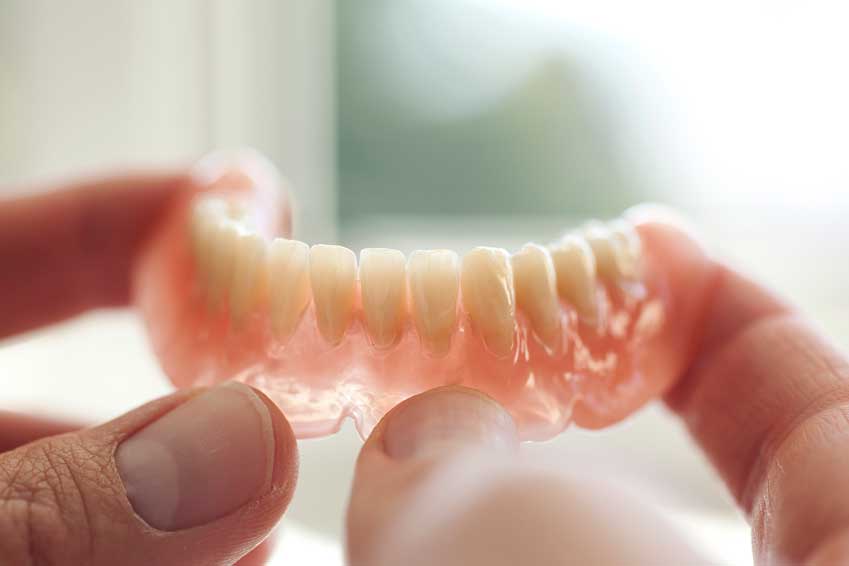For those with multiple missing teeth, dentures are a technological miracle, allowing you to function more normally. But as any denture wearer will tell you, they are not perfect.
One of the most common issues you may have with your dentures is looseness, especially with the lower one. When we say “looseness”, we mean the tendency of the lower denture to float or move when you open your mouth widely, like during a yawn, and when you speak or eat. Pain is also a common issue associated with loose lower dentures.
People often notice looseness more frequently with a lower denture when they compare them to their natural upper teeth or with an upper denture. Unfortunately, a lower denture is far more susceptible to looseness by the very nature of the mouth’s anatomical structure…
Upper good, lower, not so good
With an upper denture, the natural shape of your mouth allows for a more solid seal, especially since there is a great surface to grip onto – your palette. However, with the lower denture, there is no palette. Instead, the tongue reduces the surface area where the lower denture might adhere. Additionally, as you know, when you speak and chew, it is mostly the lower part of the mouth that moves up and down – the greater the motion, the greater the tendency for dentures to come loose.
Because there is no palette to cling to, the lower denture must be designed to resist being pulled away by the natural motion of the gums against the cheek. So by its very nature, lower dentures are more prone to being loose. This means you must consider the issues and find solutions…
Learn how to chew a new way. As a denture wearer, you must realize, you cannot eat with a removable appliance as you would with your own teeth. It is essential to learn to control your tongue and cheeks as you chew until it is natural for you (muscle memory).
Changes in your mouth can cause denture trouble. Your body is constantly going through gradual changes – that includes the jaw and gum line. These changes can render your denture unable to sustain a seal. So while it may seem that your denture is the problem, it may actually be your body. Visit your dentist as recommended to monitor these changes.
Make sure your dentures are constructed properly for your unique physiology. Surrounding the prosthetic teeth on a denture is a border of material that is shaped to create an optimal seal – too wide or too narrow and the adhesion will fail. Your dentist must be aware of this when designing the lower denture.
Watch for a denture base that is warped. Dentures make contact with the gums at the “base”. To make a proper seal, dentures should not be left to dry out – otherwise, they may degrade. Follow directions for the proper care of your dentures so that they retain their original shape and texture.
Bone resorption can be an issue. It’s a natural occurrence that when teeth fall out or are extracted, the bone in your jaw that is close to the missing tooth begins to “resorb”. So when your dentist tells you, “you don’t have enough gums” to support a denture, it means that the bone beneath the gums has degraded. This may require additional therapy.
Normal saliva is crucial to a proper denture seal. You may not know that saliva plays an important role in keeping your dentures in place. If the amount or composition of your saliva is aberrant, you’ll have an issue. This may be the result of an underlying medical condition or some drugs you are taking. Deviations in saliva production affect your overall health, and it’s a good idea to correct this.
Solutions your dentist may have

Trying to live a normal life is hard enough these days without a proper bite. As your dental team, we know ways to help mitigate the problem…
Relining your existing denture. Often, your denture can be relined to conform to the natural surface of your gum ridge, which may have gradually changed. We can take a new impression, and send out your appliance to the lab. In the interim, you’ll have to go without the denture for a day or two.
Making a brand new denture. Should it not be possible to do a reline, making a new one is often recommended. This requires anywhere from two to five dental visits – but the resulting denture can last up to seven years – well worth the bother.
Try something new – and better! Regardless of how perfectly they are fabricated, or how well you maintain them, standalone dentures are not ideal. Speak with us about implant-based solutions. These include removable dentures supported by permanent implants, and implant-supported dentures that cannot be removed – it’s all up to you (and us) to find the best way to go. Note that, similar to dentures, implants require enough healthy bone in the jaw to support them. We can recommend ways to correct this issue.
The bottom line on lower dentures
There are myriad reasons why your lower dentures may become loose, but you need not suffer the consequences – get the help you need to determine the problem and find the right solution. Visit us soon to discuss!




















